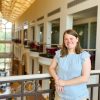During the last week of July, I had the opportunity to attend the Society of American Archivists conference in Washington, DC. This was my first SAA, and it was exhilarating (and overwhelming) to attend an event with so many archivists at once. And although it was an extremely hot week and weekend, I was able to carve out a little bit of time to explore a new area of DC and have some great meals! There were too many sessions to describe fully, but here are some of my highlights.
There were two plenary sessions, and both were thought provoking moral examinations of the archives profession. In the first session, SAA President Terry Baxter gave remarks centered on radical empathy and what it means for an archive to be centered around the community it resides in. The second session was a panel discussion with Dean Spade, Emily Drabinski, and Michelle Caswell entitled “Archives, Institutions, and Power.” Each panelist shared their experiences interacting with institutions, and illustrated ways in which these institutions were not working for the common good. SAA itself was not spared in this discussion. The panelists spoke passionately and eloquently about how these institutions could do better to actively protect library workers and patrons. It was a thought provoking discussion that I thoroughly enjoyed.
I attended the session “Searching for the Commons: Reflecting on Access Realities Surfaced through User Research,” which was an interesting panel discussion centered around research that had been done about archives users and the barriers that they face in discovering archival materials. It seemed to me that many of these barriers are somewhat inherent to archives–for example, the fact that collections are geographically spread across the country, often requiring travel to access needed materials. One of the main takeaways I had from this presentation was that one of the most effective ways to break through the barriers was by having a relationship between the archivist and the researcher.
A major theme throughout the conference was dealing with emotions and emotionally challenging collections. There were several sessions on this topic–I attended one called “She Wasn’t Difficult, She Was Grieving: Emotional Intelligence in Archival Interactions.” Unpleasant emotions often can’t be avoided in the work we do, and I have encountered this on a small scale in the past. It was nice to hear others’ perspectives and experiences with this topic and think about potential coping strategies such as therapy benefits for employees, alternative schedules and work assignments, and even accommodations for researchers working with these materials.
Some conferences leave me energized and full of new ideas. I would say this year’s SAA conference left me reflective and thinking deeply about various issues such as access, inclusion, institutional responsibility, social justice, collaboration, and many more. I was challenged to consider these deep, foundational issues, while still operating within the confines of what is practically possible for my job. Overall it was a great experience that will impact my work to come.

10 Comments on ‘Kate T at SAA’
Thank you, Kate, for this thought provoking recap. You’ve reminded me how working in archives can be challenging for both the researchers and the archivists. What powerful conference content!
Sounds like a great experience Kate!
Thanks for this review, Kate, I’m so glad you were able to attend!
Kate, sounds like a wonderful experience!
Thanks for sharing — makes me miss my SAA days!! I am glad you were able to attend.
What a wonderfully reflective and cogent summary of your conference! Thanks for sharing, Kate.
Thank you for sharing, Kate. I sounds like a wonderful conference. I really like the grounded, realistic approach.
I’m glad that you enjoyed your first SAA conference! It looks like you received some great takeaways from it.
Sounds like you had a great first SAA! Glad you were able to go!
Sounds like an impactful experience – I always appreciate the opportunity and think about the work that archivists and archives users do together, it’s easy to focus on tasks when working with collections. Thanks for sharing!